|
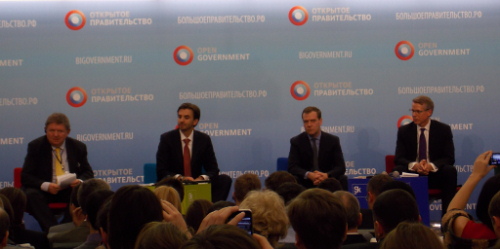 The Conference was organized by the Government of the Russian
Federation with support of the Expert Council under the Government of RF, non-commercial
organization “Development Foundation of the Center for Development and
Commercialization of New Technology” («Skolkovo» Foundation) in association with the World Bank, the Russian presidential Academy of National
Economy and Public Administration, National
research University “Higher School of Economics”, the Foundation of information
democracy development, the Foundation of information freedom, Non-commercial
partnership Information Culture, SAP AG, PACO. Information support to the event
preparation and execution was given by the Institute of the Information
Society. The Conference was organized by the Government of the Russian
Federation with support of the Expert Council under the Government of RF, non-commercial
organization “Development Foundation of the Center for Development and
Commercialization of New Technology” («Skolkovo» Foundation) in association with the World Bank, the Russian presidential Academy of National
Economy and Public Administration, National
research University “Higher School of Economics”, the Foundation of information
democracy development, the Foundation of information freedom, Non-commercial
partnership Information Culture, SAP AG, PACO. Information support to the event
preparation and execution was given by the Institute of the Information
Society.
The Conference opened at the premises of the Moscow
Metropolitan Governance University. At
the plenary session “Elements of the system “Open region. World trends and
Moscow’s experience” the Minister of RF Mikhail Abyzov, Expert on the open
government Eric Braverman («McKinsey» company - USA), Managing partner of the
«McKinsey» company (France) Ekaterina Dèfossèe and Deputy Mayor of Moscow in the Government of
Moscow, Head of Mayor’s Administration and the Government of Moscow Anastasiya
Rakova addressed to the participants.
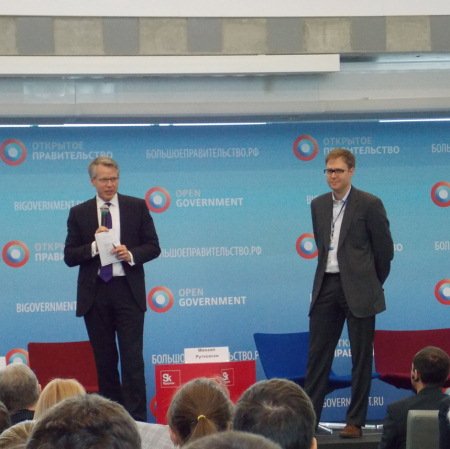 According to international experts several global
factors affected the necessity of implementation of the “open government”
concept, such as: new technologies and
their distribution around the world, influence of demographic factors, increase
in complexity of public administration processes, macroeconomic uncertainty,
budget cutbacks in public sector, rivalry for limited resources, and search for
high potential personnel. Developed
countries need new sources of ideas and information. The necessity ripened to
attract citizens to generation of ideas aimed at improvement of public
services, there is necessity to test problems and suggestions from users at
early stages of services’ development. Portals of open data, where inhabitants have
access to information about city expenses, shared in the internet videos of
City Formation Committee meetings (e.g. Calgary, Canada), as well as internet
forums, where problems of gardens, parks and public territories in cities are
widely discussed, - such phenomena increase responsibility of civil servants
for their work. And this is far from a complete list of examples of Open
Government in countries, which joined the Open
Government Partnership. According to international experts several global
factors affected the necessity of implementation of the “open government”
concept, such as: new technologies and
their distribution around the world, influence of demographic factors, increase
in complexity of public administration processes, macroeconomic uncertainty,
budget cutbacks in public sector, rivalry for limited resources, and search for
high potential personnel. Developed
countries need new sources of ideas and information. The necessity ripened to
attract citizens to generation of ideas aimed at improvement of public
services, there is necessity to test problems and suggestions from users at
early stages of services’ development. Portals of open data, where inhabitants have
access to information about city expenses, shared in the internet videos of
City Formation Committee meetings (e.g. Calgary, Canada), as well as internet
forums, where problems of gardens, parks and public territories in cities are
widely discussed, - such phenomena increase responsibility of civil servants
for their work. And this is far from a complete list of examples of Open
Government in countries, which joined the Open
Government Partnership.
By accepting suggestions and recommendations from
citizens, by examining the results of public hearings, the authorities decrease
the percentage of undesirable consequences of decisions made, redirect and
transform the flow of possible negative.
Ekaterina Dèfossèe («McKinsey» company -(France) reported that the IT-service in
New-York was transferred to the direct subordination of the city mayor, the
city portal of New-York publishes more than 1000 types of open data, a platform
for parents was created, where they can obtain information about children,
teachers and schools.
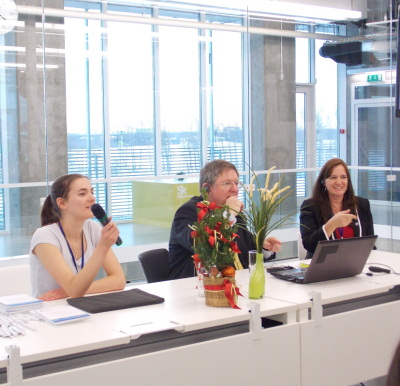 Minister Mikhail Abyzov reported that in April 2012
Russia expressed desire to join the Open Government Partnership (OGP) - international organization, which unites
more than 50 countries, and whose activities aim at increase in transparency
and accountability of public services, thus emphasizing its intention to
increase transparency in the public administration. Russia
is creating a library of international experience on Open Government formation. Minister Mikhail Abyzov reported that in April 2012
Russia expressed desire to join the Open Government Partnership (OGP) - international organization, which unites
more than 50 countries, and whose activities aim at increase in transparency
and accountability of public services, thus emphasizing its intention to
increase transparency in the public administration. Russia
is creating a library of international experience on Open Government formation.
Anastasiya Rakova also delivered a welcoming speech
and emphasized that the Moscow Government in its work with citizens must act
under the slogan "involvement and convenience". He report was rich with
arguments and reflected active search for new forms of joint efforts of public
authorities and inhabitants of such metropolis as Moscow aiming at increase in
the quality of life in the city.
Moscovites can currently get public services in comfortable conditions and controlthe results of authorities’
work using portals specially created for these purposes:
''Our city'' , ''Moscow roads'' , ''Moscow houses'' ,
''Mobile reception''.
The program of the Conference included multi format
events: panel discussions, round tables, master classes, discussions in the
form of “brainstorming”, which should have resulted in clear understanding of
what is now being done in the sphere of Open Government and what has yet to be
done, as well as in exchange of best
practices and experience. For this
purpose, particularly, lead experts in the sphere of Open Government from
countries, which succeeded in solving this problem, were invited.
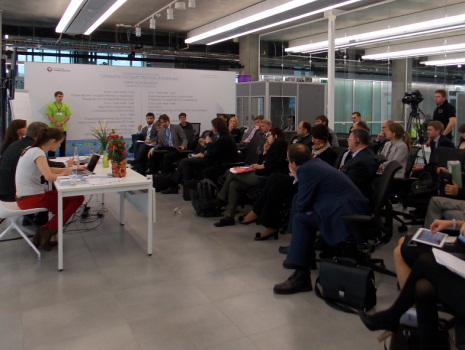 Experts involved in the work of th Conference by organizers and,
firstly, representatives of the World Bank: Experts involved in the work of th Conference by organizers and,
firstly, representatives of the World Bank:
- Chris Vein, USA,Chief Innovation Officer for Global Information and
Communications Technology Development âWorld Bank (USA);
- Jeff Kaplan, USA, Managing
director of the Open ePolicy Group, Senior ICT-consultant of the
World Bank;
- Mario Spinelli, Brazil, Secretary
of Corruption Prevention and Strategic Information
Office of the Comptroller General – Presidency of the Republic of Brazil;
- Irina Bolychevsky, UK, Program manager of the «Open Knowledge» Foundation;
- Eric Braverman, USA. Partner of «McKinsey & Company Inc»;
- Roberto Unger, Brazil, Professor, Harvard
University;
- David Eaves, Canada, Open Government Activist and Negotiation Expert, public policy entrepreneur;
- Meghan Cook, USA, Program manager, State
University of New York, Albany.
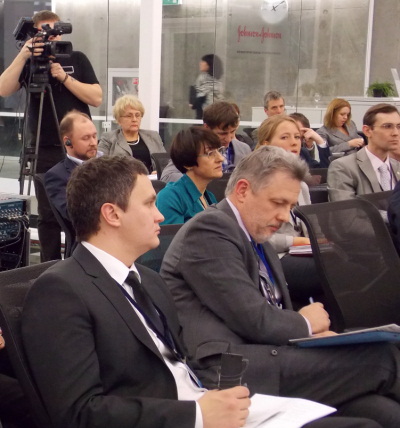 IIS representatives took part in three sessions of the World Bank program: IIS representatives took part in three sessions of the World Bank program:
1. Open public administration: international
practices, experience and opportunities for Russian regions.
2. How to increase information transparency and accountability of public authorities?
3. How to create effective infrastructure of citizens’
involvement in the public administration processes? Best world practices.
Yuri Hohlov, Chairman of the IIS Board of Directors,
speaking as an expert at the session «How to create effective infrastructure of
citizens’ involvement in the public administration processes? Best world
practices», emphasized that the basic problem in Russia is the significant
inequality between regions in terms of ICT development, and that overcoming
this inequality is the vital challenge of public authorities. «Russia needs
open power, – said Yuri Hohlov. – We must not forget that open government
in Russia should unite interests of the authorities, citizens and business». Russia
at all levels – federal and municipal – should articulate and accept the
strategy and the action plan aiming at expanding the openness of the power.
The second day of the Conference was held in the
Innovation center "Skolkovo", the opening speech was delivered by Dmitry
Medvedev, prime-minister of RF. The halls of the conference hosted fruitful
exchange of opinions on Open Government in Russia formation and development
with use of the world’s best practices, which was held in the form of round
tables, master classes and "brainstorming".
The work of the international conference was attended
by: Tatiana Ershova, Director General of the Institute of the Information
Society; Olga Reznikova, IIS Deputy Director General; Nina Semenova, Deputy
Editor-in-Chief of the "Information Society" journal; Project Managers Irina Miroshnichenko, Marina
Smyslova and Olga Kopyeva, and IIS Analyst Vladimir Kondratyev. |

